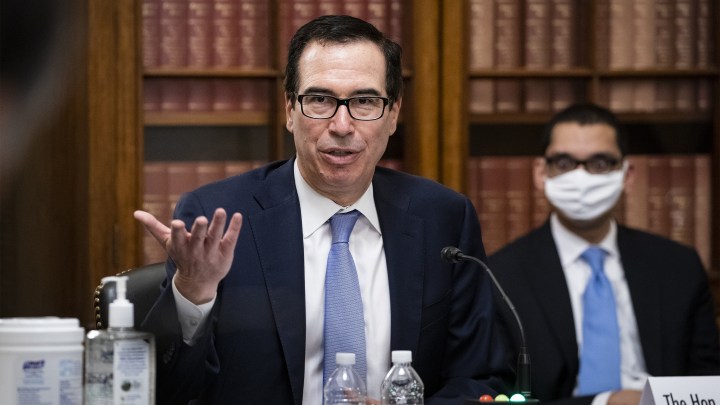
Who got those PPP loans? The government doesn’t want to tell.
Who got those PPP loans? The government doesn’t want to tell.

Who got the more than $500 billion in Paycheck Protection Program loans that the CARES Act gave to businesses to ease the pain of the pandemic? We may never know.
Treasury Secretary Steven Mnuchin and National Economic Council Director Larry Kudlow say the information should not be released.
The Treasury Department is funding the CARES Act with taxpayer money. When the government shells out your taxpayer money, it usually tells you where it’s going.
“The accountability for who gets it, how much they receive and whether they’re entitled to it. That is a trust factor,” said Emma Coleman Jordan, professor of business law at Georgetown University.
The Trump administration said what we should care about is that the loans comply with the CARES Act. But who received them? The treasury secretary told Congress last week that it’s “proprietary information.”
Mehrsa Baradaran, a law professor at the University of California, Irvine, thinks there are a couple of other things at play.
“Part of this bill is they left it a lot up to banks. And it’s possible that they just don’t know where the funds went,” Baradaran said. “It’s possible that they do know, and they don’t want us to know.”
We do know where some of the money went — to big names like Shake Shack and Potbelly, which pledged to return the loans. But we only know that because they’re publicly traded companies.
“PPP was sold to the American public as loans to small business workers,” said Aaron Klein, a fellow at the Brookings Institution. “They’ve become grants to big business creditors.”
Grants, not loans, because businesses don’t have to repay them if they fulfill certain requirements, like rehiring staff. Klein said that makes transparency crucial.
“Failing to disclose who got this money undermines this response and future responses,” he said. Klein doesn’t just mean future bailouts. He means like tomorrow. Because there’s still about $130 billion left in the PPP pot.
There’s a lot happening in the world. Through it all, Marketplace is here for you.
You rely on Marketplace to break down the world’s events and tell you how it affects you in a fact-based, approachable way. We rely on your financial support to keep making that possible.
Your donation today powers the independent journalism that you rely on. For just $5/month, you can help sustain Marketplace so we can keep reporting on the things that matter to you.


















